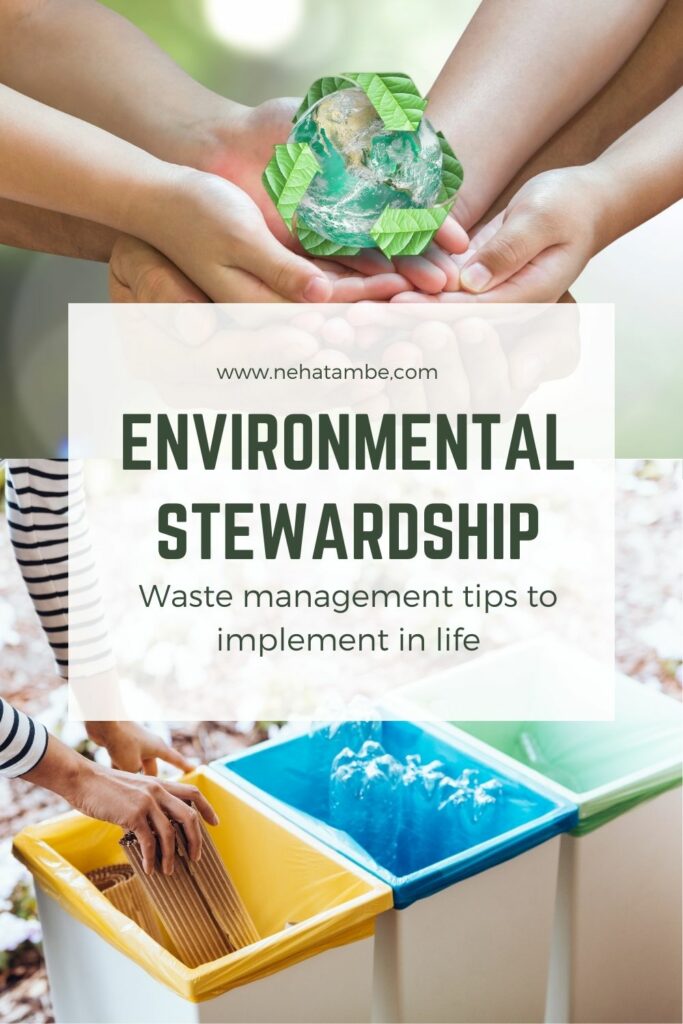Table of contents
This is a part of a series around sustainable living. You can read the first post in the series and the idea behind this here– UN Sustainability Goals and why is it important
Today, I am discussing environmental stewardship that each one needs to own up; waste management and how that can help reduce CO2 emissions in the atmosphere.
Uttarakhand glacier burst is the latest tragedy relating to climate change. As the death toll rises and survivors stare at an uncertain future, we need to sit up and make a note of the devastating harm that climate change can cause. The more callous our attitudes towards climate change, the greater the danger we threaten to inflict on ourselves and our fellow beings. Glaciers world-over are receding at a fast rate. The Himalayas have seen some horrific disasters in recent times, with links to glacial melting and climate change.
How is glacier melting linked to waste management?
Better waste management leads to lower CO2 emissions in the atmosphere. CO2 is a greenhouse gas which can trap sunlight and speed up global warming–the primary cause of glacier melting.
Glaciers act as large mirrors and deflect sunlight back into the atmosphere and regulate the planet temperatures.

Less waste means less Co2 emissions–meaning lower global warming and slow glacier melting.
Sustainable living is the first step towards acknowledging the threat and making constructive lifestyle changes to reduce our carbon footprint. It requires environmental stewardship from each one of us today to effectively reduce possible climate change effects.
Sustainable practices at home
The core belief in sustainable practises is to reduce waste and human pressure on natural resources. Manufacturing, distribution, use of products and the resulting waste–all cause greenhouse gas emission.
Waste prevention and recycling are proper ways in which we can tackle individual carbon footprint.
“India generates around 60 million tonnes of garbage every single day and almost 45 million tonnes, a whopping 75%, of the garbage are dumped untreated in the landfills.”
Swachh India.NDTV
Environmental Stewardship needs to be a pre-requisite in human interaction with the natural environment–land, water or air. Starting with waste management, we need to move towards reducing the burden by minimizing waste and penalizing hoarding.
9 Sustainable waste management practices that you can start today
1. Segregate your garbage
This is the simplest thing that we can do as an individual. Just keep two bins–one for dry and the other for wet and drop the waste accordingly. Line both the bins with biodegradable plastic bags and create smaller paper bags to dispose of wet waste. You can handover the paper bag as then you will reduce the amount of plastic that goes out.
Instead of disposing of the plastic milk packets and other plastic containers in the bin, we can dispose it responsibly. All we need to do is wash it with hot water, dry it, and store in a dry place. Once a month these can be traded with the scrap dealer in exchange for some money!’
2. Upcycle or recycle your clothing, toys and books
Exchange clothes, books, and toys to ensure there is a lesser need to buy them. Finding a like-minded community that is interested in exchanging good quality clothing, renting toys and books, etc. can go a long way in ensuring children’s enjoyment does not overshadow environmental needs.
3. Avoid disposable cutlery and other onetime use products
One time use plastic products are a great bane to our environment. We can replace them with sustainable and natural cutlery. Always carry cotton, foldable bags to reduce the use of plastic bags. Similarly, biodegradable wooden or areca nut-leaf based cutlery can help in reducing your carbon footprint. Shift to portable steel and copper tiffins and water bottles to enhance the re-use mindset.
4. Compost your kitchen waste
If you live in an independent house compost your kitchen waste. Homes with huge balconies too can use portable compost bins to easily convert kitchen waste into manure. Many large societies have in-house compost facilities, make the most of that. There are a few social enterprises like Mobitrash that can help individuals and societies dispose of their garbage responsibly.
For your garden waste you can connect with organizations like Brownleaf that collect your garden waste like leaves and twigs and deliver it to compost makers.
5. Dispose your e-waste consciously.
E-waste is another extensive area that needs immediate attention. The carbon emissions from this kind of waste are huge and with no proper disposal mechanisms, it usually finds its way into the landfills. It is important that we dispose off our e-waste responsibly. There are a lot of self-help groups that collect and dispose E-waste responsibly. One such agency in Pune is Swach
6. Use recycled paper
This is another simple effort that will go a long way. Use recycled paper as much as possible. Every time a tree is cut, we are losing an efficient CO2 management mechanism. The lumbering, transport and manufacture release another set of CO2 in the environment. Recycled paper means fewer trees are cut and lower CO2 emissions.
7. Avoid use of plastic utensils and choose steel, copper products
Plastic is non-biodegradable, but apart from this, regular consumption of eatables from these can have harmful effects on our health in the long term. It is a smart choice to shift to steel or other metal products as these can be easily recycled, they are long-lasting and have a zero effect on our health. At the end of the product cycle, it can easily be recycled.
8. Minimize use of products that fall under toxic waste category
Toxic waste is not just related to industries, our household waste too adds a sizeable amount of toxic waste into the environment. Waste like batteries, drain cleaners, insecticides, pesticides, old paints, nail paint removers, floor cleaners, bleach, medicines etc. amounts to toxic waste. These need to be disposed off responsibly to ensure that they do not find their way into landfills and percolate into the soil and water. When using chemicals like bleaches drain cleaners or floor cleaners, try to look for natural or plant-based products to reduce your impact on the environment.
9. Be energy efficient at home
This is the simplest of all. Saving energy = lowering wasteful use. Buy appliances that are energy efficient. Service and maintain regular usage products as this will save your electricity costs while being good for the environment.
- Turn off lights when not in use.
- Use natural lighting as much as possible.
- Do not keep appliances on when not in use
- Switch to energy efficient light bulbs and tubes.
- Consider solar based power back-up and water heaters instead of electricity based if you live in independent homes.
Most energy is based on fossil fuels. The less we consume, lower our impact on the environment and natural resources. Apartments are moving towards solar based water heaters, water recycling and sewage treatment however this needs to move from amenities to essentials column to make a meaningful impact.
Humans alone produce 11.2 tonnes of solid waste. If we don’t take effective steps towards waste management today, we might have to live with garbage hills soon. We have a live example in Delhi and we do not want that to be our landscape across the country. Environmental stewardship is not a fancy word, but an urgent need that each one needs to understand.

Do you have any more tips around waste management? How are you and the communities you live in contributing towards it? Do share in comments below.
This post is part of Blogchatter’s CauseAChatter – Environmental Talks series.

Good, practical tips!
Did we ever expect that things would come to this. How our world has changed because of our carelessness and unscrupulous acts.!
Oh, there is a serious need for all of us to manage waste better. Last year, I wanted to dispose off old printer, PlayStation, Mobiles etc and couldnt find an e-waste collection centre in my city. e-waste is creating create environmental and health risks! Great pointers, thanks for reiterating these and spreading the awareness.
You are so right these are the need of the hour buddy, I am doing my bit and really hope everyone else realises his too
All changes start from small.. we too have started doing it. We have stopped used of plastic bottles n containers and moved to glass ones and I also handover clothes n books n toys to someone else who can make use of it.
We are living with so much fear of calamities due to global warming. Some statistics you mention are alarming and shocking. Sharing your post so more people are aware of this.
Home is the place where we can start bringing in the change will will have a great effect on a.large scale. We have also started these and many other changes at our home to save the environment.
Those garbage hills at Delhi is a huge reminder, day in n out, to do something about waste. The best is to start at home.
I agree that each household needs to be very conscious of the waste that is being created and also how they are getting rid of it.
you have shared some easy to follow tips which can easily be implemented..
Your post shares many pointers that can be easily applied in each household and we all collectively can bring a positive change together.
Waste management is a crucial issue and you rightly pointed out, can be done easily at home without a lot of effort. Recycling, reusing and making environment-friendly choices is the best way to go.